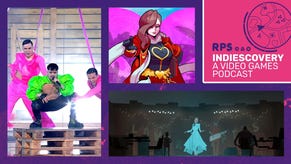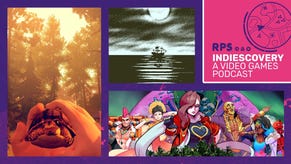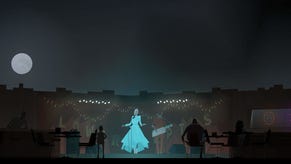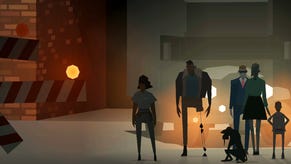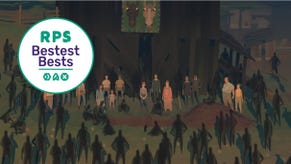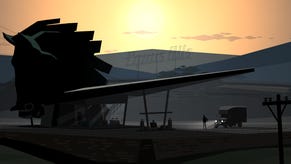Introducing Last Life, Aka 'Kentucky Route Zero In Space'
Double Fine (Published) Adventure
You might remember that we liked sleepy-as-the-night, sharp-as-a-knife adventure Kentucky Route Zero quite a lot. We even gave it game of the year, doncha know. So when Last Life creator Sam Farmer told me his game was best described as "Kentucky Route Zero in space," I nearly warbled with glee. The noir-themed tale of a detective trying to solve the mystery of his own murder has Double Fine's blessing and backing, and it's taking to Kickstarter for one more boost. I sat down with Farmer for what turned out to be his first interview ever, and we discussed Last Life's universe and story, Sherlock-style inspection mechanics, Double Fine's involvement, what it means to be "noir," and transhumanism. It's all below.
RPS: The first thing I was wondering is, can you just give a quick overview of what Last Life is?
Farmer: Last life is a sci-fi noir adventure game in which you investigate your own murder. You play as this protagonist, Jack Parker, who is a private eye on a case, and you're in a world where they have the technology so that you can upload your brain to a computer. When you die they can 3D print you a new body. So death is not really as big of a thing anymore. It's more like property damage. But information is key. So you are killed while you're on this case at the start of the game, and when you get brought back to life you have to kind of piece together the case that you were on, and find the killer, and piece together the bigger deeper, mysteries of this world.
RPS: What's the basic setting for that? I know that you said it's a future Mars kind of thing, but how does this society work? What's the core of it?
Farmer: It a retro-futuristic society. This is hundreds of years in the future. Part of the premise of this world is we're expanded off of earth, but only as far as the solar system. So we have colonies on The Moon, Mars, various other planets and moons. That's as far as it goes. 11 years before the events of this game take place there's this cataclysmic event that happens place on Earth, and Earth is basically rendered uninhabitable. Huge huge numbers of people die in this terrible event. Now all that's left are these colonies on these other planets, and they're kind of left in this tattered state.
RPS: Your Kickstarter mentions both old school adventure games and The Walking Dead as inspirations. How to you tow that line? Walking Dead is very streamlined. There's not a lot of puzzling in it. It's about the story and the cinematic element of it. Old-school adventures tend to be more skewed in the opposite direction. Where do you fall on that spectrum?
Farmer: I would say fewer puzzles and more emphasis on story telling, for this game. The puzzles are just there to help the story and it's not so much... this isn't a game that's intended exclusively to challenge you intellectually, but to keep you engaged. Have you played Kentucky Route Zero?
RPS: Oh yes. Most certainly.
Farmer: So I liken this game to Kentucky Route Zero in space.
RPS: Kentucky Route Zero was our Game of the Year last year, actually. I can definitely see a few stylistic similarities too.
Farmer: Especially the dialogue system is very similar right now, and definitely I think aesthetically there are parallels between the two of them for sure, like with the camera angles.
RPS: So with the dialogue system, when you say similar, Kentucky Route Zero had elements of text adventure in it. Are you expanding on that as well?
Farmer: I might be going into that territory. It really depends on how the Kickstarter goes and how deeply I'm able to flesh out the world. But I think that the text adventure itself was a really cheap way for them to build a bigger world, which I liked.
RPS: How far are you going with choices? Are you trying for a Walking Dead WHO LIVES WHO DIES DECIDE NOW NOW NOW setup, or is choice more of a role-playing performance, ala Kentucky Route Zero?
Farmer: I think what's important is that the player feel like they have autonomy, and they feel like their choices are making a deep impact on the game. But the extent that their choices actually matter? I'm of the opinion that Kentucky Route Zero does it. You really feel like you're an actor participating in that space, but unlike The Walking Dead, which has more significant choices, the choices are secondary I guess to the experience and the immersion of the game.
So it's important that the player has choices, I completely agree, and that they feel like they're making decisions that propel the story forward. But I don't know that it's going to be a replayable game in that sense.
RPS: Last Life's main character is a detective, but how does that play into puzzling and adventuring? Will I sleuth? Will mumble to myself in a hardboiled fashion?
Farmer: So some of the puzzles will be deduction. There's this bar scene, it's kind of my vertical slice demo level, and in the bar scene you've got one goal really. You need to find a way to extend your life because this timer is running down. Part of the story is when you come back to life you've got just a couple of hours left to live, for reasons that make sense to the story world. The insurance company that prints you bask was trying to get you to re-enroll in their life insurance.
So they limit your time. You're almost at the end of that when this scene comes around, and you're meeting with an old colleague of yours, Misty. She's going to give you the money you need to buy an extension. So that's the set up, and this is pretty far in to the first episode. But when you get to this bar she runs. She's nowhere to be found. You need to look around for where she is. Then when you locate her she's on the second floor, so you need to manipulate the characters and the scene around you so that you can find a way up to the second floor. That's the more general way to state it. I could give you the blow by blow, but it's probably best left to the game play to do that.
RPS: Is that sort of the general set up of puzzles? How much variety are you going to have just in terms of different puzzle types and things you'll be doing in the game?
Farmer: There's going to be a lot of custom stuff. As with adventure games, a lot of this stuff is just really unique to the setting and scenario, so unlike more systemic games hopefully each of these puzzles will have relevance to each individual problem. Rather than a lock picking puzzle you do every time you pick a lock. That's what I mean by deduction. You have to understand what happened in the story and what people are telling you in order to deduce your way forward. Another example is you might need to go to a crime scene and investigate that. Have you ever seen BBC's Sherlock? It's something like that where you're going and inspecting each of these element and in doing so you will uncover things, and uncover new pathways that lead forward in the story.
RPS: Obviously a lot of Noir stuff, most of it is investigative, but there's also space for heavy, sloppy, usually alcohol-infused fisticuffs. Is there going to be an element of combat in your game? If so, is it more action driven, or is it kind of adventure interface combat?
Farmer: The combat that does happen, or let's say the actions sequences that happen, when they need to happen, will require that of the player. So it's not like Walking Dead, which admittedly is a very different paced game than Kentucky Route Zero. You have to actually respond or else you fail. I'm trying to avoid failure states as much as possible in this game, but I know that with the story I want to tell, it's quite likely that I'm going to have to put some reflex based game play mechanics into the game. So something like a chase sequence. Or... probably not so much a shoot out? It's not going to ever devolve to that. It's never going to feel routine to be in combat. It's going to be kind of the exception to the rule. But yeah that's a tricky balance.
RPS: Looking at the art, video, and images in the Kickstarter, it already looks like you've got a fair amount of game here. How long have you been working on this?
Farmer: Full-time for half a year, and 3 years before that I've been ideating and coming up for the world for this. I've been working at Glitch City, which has been really helpful.
RPS: Oh, that's where the Hyper Light Drifter guys and [Thirty Flights of Loving developer] Brendon Chung and the Nidhogg folks work, isn't it? That's got to be incredibly useful.
Farmer: It's incredible. I feel like I'm working along side my idols while I'm here. To be able to ask them a question like that is really helpful. On Wednesdays we have project workshop, where we all sit around and have lunch in out living room area. Each person gets ten minutes to ask a question, and source feedback from the other developers. Like about a problem that they're having that they need help with. And it's really cool, because you can help other people with their issues and feel good about that, and you've got a place to ask them really touch game development or even other questions. It's a good community.
RPS: When did Double Fine get involved? To what extent will they be aiding in development, if at all? And what does having a publishing partner mean for your Kickstarter?
Farmer: They got involved the week after GDC, when I followed up on a tweet from Greg Rice asking for submissions to their new indie publishing initiative. They moved incredibly fast, which was great, because I was basically ready to launch.
In our deal with Double Fine, we own 100 percent of our IP and they can use their great network of distribution to solve so many headaches for smaller indies like us. But I want to make it truly clear: DF gets absolutely no money from our Kickstarter. Any money we raise - minus the chunk we need to pay to KS, and another chunk to the taxman - goes directly to making the game amazing. That's the way they want it. And we are all really jazzed about their offer to mentor us along the way. This makes us so honored and happy.
RPS: Will you be consulting Double Fine for input, though?
Farmer: Advisement was actually one of the big reasons for me to work with Double Fine on publishing Last Life. It would be a dream come true to have Tim and Double Fine as a sounding board throughout development, with their immense adventure gaming experiences at the ready.
When it comes to creative development, however, there is a fine line between advising and putting creativity on a leash. I trust Tim to know the difference from years of being on the development side of these kinds of relationships. And I think it ultimately comes down to who has the money, which is why Kickstarter is so essential to giving indies like me this creative freedom, regardless of how we choose to publish our game.
While Double Fine and I are currently focused on launching this Kickstarter, when we return to development Tim's offered to provide feedback on builds when I ask and even get more formalized feedback from their whole studio in one if their "Hour of Fun" playtest sessions.
Double Fine's feedback will also be cross-referencing with the feedback I get from my Glitch City comrades, advisors from USC, and others to see which areas of the game need the most work in the most objective way possible. But I must admit, it was super exciting, not to mention surreal, to see Tim play the prototype and chuckle all the way through.
RPS: You mentioned dry PI humor, and some of the Kickstarter bits are written in that style of lingo. How much are you going into that, because you can be "noir" in a number of ways, and sometimes it gets pretty goofy.
Farmer: This is not intended to be a funny noir, you know a campy noir? Though I have thought about that. It's much more of the grounded stylized noir, with some bits of wit and humor thrown in. But it's the driest, right?
RPS: What are your primary influences in terms of other noir media? What are some of your influences in terms of tone and vibe?
Farmer: Twin Peaks is going to be my first call out. I watched the full show a year ago and it kind of blew my mind. The way that Lynch managed to combine noir with weird, sometimes funny bits, I thought was really interesting. Blade Runner, kind of an obvious linkage. I've been told that I really need to watch DOA, but I haven't so I can't call that one out. It's a lot of Noir movies and books. Neuromancer is a big one for me, the Willaim Gibson book. And I was feeling like, “that's the kind for sci-fi noir, literary sci-fi noir, that's a big influence on me.”
RPS: I've seen quite a few things - games, especially - that wear the "noir" tag without really committing. Space Noir, I'm (maybe) looking at you. What does noir mean to you? What separates the authentic efforts from the posers?
Farmer: First person narrator. Hard-boiled dialogue. Often but not always black and white. Usually about crime. Er, always about crime. Often a dead body can be in it.
RPS: You left out one that I personally find to be true, which is whiskey must be consumed at some point.
Farmer: And cigarettes must be smoked.
RPS: Or a cigar. You can do a cigar.
Farmer: That's true. Well, my games have e-cigarettes, so there's that. But you're right, whiskey must be consumed. Or right, Casablanca. That's a big one.
Check back soon for the more personal side of Last Life's story - the game's primary real life influences, including Farmer's lifelong struggles with his own health and the traditionally abysmal US Healthcare system.








